Brazil
 From Conservapedia
From Conservapedia | República Federativa do Brasil | |
|---|---|
| Flag | Coat of Arms |
| Capital | Brasilia |
| Government | Presidential Federal republic |
| Language | Portuguese (official) |
| President | Lula da Silva |
| Current Conservative Leader | Jair Bolsonaro |
| Area | 3,287,597 sq mi |
| Population | 215,000,000 (2020) |
| GDP | $1,850,000,000,000 (2020) |
| GDP per capita | $8,605 (2020) |
| Currency | real |
Located in South America,[1] Brazil has the third largest area among North/South American countries and the second largest population, having a total of 213 million people as of 2020. Brazil is the only Portuguese-speaking nation in the Americas. About three-quarters of all Brazilians belong to the Roman Catholic Church; most others are Protestant, members of a growing evangelical movement, or follow practices derived from African religions. São Paulo is its largest city, and the famous Rio de Janeiro is a major port city and former capital of Brazil. Brasilia is the present capital and became so in 1960 after it was planned and developed in 1956.
Brazil successfully hosted the 2016 Summer Olympics, the 2014 World Cup, and the 2013 World Youth Day. Brazil is known for its spectacular beaches, such as its world-renowned Copacabana Beach in Rio de Janeiro.
Pele, for long the most famous athlete in the world (he played soccer), was Brazilian.
Until 2023, Brazil was led by the conservative president Jair Bolsonaro. His foreign minister was the anti-Marxist conservative Ernesto Araújo. In the presidential election of 2022, Bolsonaro was narrowly, reportedly defeated by Lula da Silva, the leftist and then former president and an ex-convict, the election is questioned because of several issues with the electronic voting system.
Contents
Geography[edit]
Brazil's topography includes the world's largest rain forest, which occupies roughly two-thirds of country. Through this forest run the many tributaries of the Amazon, second-longest river (after the Nile) in the world.
- Area: 8,511,965 km2. (3,290,000 sq. mi.); slightly smaller than the U.S.
- Cities: Capital—Brasilia (pop. 2.5 million). Other cities—São Paulo (10.9 million), Rio de Janeiro (6.1 million), Belo Horizonte (2.4 million), Salvador (2.9 million), Fortaleza (2.4 million), Recife (1.5 million), Porto Alegre (1.4 million), Curitiba (1.8 million).
- Terrain: Dense forests in northern regions including Amazon Basin; semiarid along northeast coast; mountains, hills, and rolling plains in the southwest, including Mato Grosso; midwestern savannahs; the world's largest wetland area; and coastal lowland.
- Climate: Mostly tropical or semitropical with temperate zone in the south.
People[edit]
With its estimated 186 million inhabitants, Brazil has the largest population in Latin America and the fifth-largest in the world. The majority of its people live in the south-central area, which includes the industrial cities of São Paulo, Rio de Janeiro, and Belo Horizonte. Urban growth has been rapid; by 2005, 81% of the total population was living in urban areas. This growth has aided economic development but also has created serious social, security, environmental, and political problems for major cities.
Six major groups make up the Brazilian population: the Portuguese, who colonized Brazil in the 16th century; Africans brought to Brazil as slaves; various other European, Middle Eastern, and Asian immigrant groups who have settled in Brazil since the mid-19th century; and indigenous peoples of Tupi and Guarani language stock. Intermarriage between the Portuguese and indigenous people or slaves was common. Although the major European ethnic stock of Brazil was originally Portuguese, subsequent waves of immigration have contributed to a diverse ethnic and cultural heritage.
From 1875 until 1960, about 5 million Europeans immigrated to Brazil, settling mainly in the four southern states of São Paulo, Parana, Santa Catarina, and Rio Grande do Sul. Immigrants have come mainly from Italy, Germany, Spain, Japan, Poland, and the Middle East. The largest Japanese community outside Japan is in São Paulo. Despite class distinctions, national identity is strong, and racial friction is a relatively new phenomenon. Indigenous full-blooded Indians, located mainly in the northern and western border regions and in the upper Amazon Basin, constitute less than 1% of the population. Their numbers are declining as contact with the outside world and commercial expansion into the interior increase. Brazilian Government programs to establish reservations and to provide other forms of assistance have existed for years but are controversial and often ineffective.
Brazil prohibits abortion unless necessary to save the life of the mother. Sometimes courts have authorized abortion in specific cases of rape or fetal handicap.[2]
Government[edit]
Brazil is a federal republic with 26 states and a federal district. The 1988 constitution grants broad powers to the federal government, made up of executive, legislative, and judicial branches. The president holds office for four years, with the right to re-election for an additional four-year term, and appoints his own cabinet. There are 81 senators, three for each state and the Federal District, and 513 deputies. Senate terms are eight years, staggered so that two-thirds of the upper house is up for election at one time and one-third four years later. Chamber terms are four years, with elections based on a complex system of proportional representation by states. Each state is eligible for a minimum of eight seats; the largest state delegation (São Paulo's) is capped at 70 seats. This system is weighted in favor of geographically large but sparsely populated states.
Fifteen political parties are represented in Congress. Since it is common for politicians to switch parties, the proportion of congressional seats held by particular parties changes regularly. The major political parties are:
- Social Liberal Party (PSL-conservative-right)
- Workers' Party (PT-left-wing)
- Brazilian Democratic Movement Party (PMDB-center)
- Brazilian Social Democratic Party (PSDB-center-left)
- Progressive Party (PP-right)
- Brazilian Labor Party (PTB-center-right)
- Democrats (DEM-center-right)
- Brazilian Socialist Party (PSB-left)
- Popular Socialist Party (PPS-left)
- Democratic Labor Party (PDT-left)
- Communist Party of Brazil (PCdoB-left)
- Socialism and Liberty Party (PSOL-left)
President Lula was re-elected October 29, 2006, in a second round victory with over sixty percent of the vote, over Geraldo Alckmin of the PSDB. Lula's PT party failed to win a majority in either the lower or upper houses in concurrent legislative elections and will be obliged to form a coalition with the centrist PMDB party—which won the most seats in the lower house and may end up with the largest number in the Senate—and a collection of minor parties. However, party loyalty is weak in Brazil, and it is common for politicians to switch parties, changing the balance of power in Congress. The PT won five of twenty-seven governorships, but the opposition PSDB remains in control of the critical states of São Paulo and Minas Gerais. The PMDB, as in the legislative elections, won the most governorships of any one party, controlling seven states. Because of the mandatory revenue allocation to states and municipalities provided for in the 1988 constitution, Brazilian governors and mayors have exercised considerable power since 1989.
Lula's electoral victory came despite a series of corruption scandals that resulted in the resignation of senior PT officials and the electoral defeat of several congressmen from parties allied to the PT. At least four congressional investigations are ongoing, though Lula has yet to be personally linked to any of the scandals.
In the 2018 presidential election, conservative Jair Bolsonaro was elected Brazil's president, marking a major shift in Brazilian politics from the Marxist Left to the conservative-nationalist Right.
Chief of State and Cabinet Members[edit]
- President—Lula da Silva
- Vice President—
- Minister of Defense—
- Minister of Finance—
- Minister of Foreign Affairs—
- Minister of Science and Technology—
- Minister of Justice—
- Chief of staff—
Foreign Relations[edit]
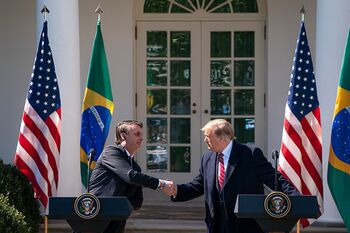
Brazil has traditionally been a leader in the inter-American community and played an important role in collective security efforts, as well as in economic cooperation in the Western Hemisphere. Brazil supported the Allies in both World Wars. During World War II, its expeditionary force in Italy played a key role in the Allied victory at Monte Castello. It is a member of the Organization of American States (OAS) and a party to the Inter-American Treaty of Reciprocal Assistance (Rio Treaty). Recently, Brazil has given high priority to expanding relations with its South American neighbors and is a founding member of the Latin American Integration Association (ALADI), the Community of South American Nations (CASN) and Mercosul, a customs union including Argentina, Uruguay, Paraguay, Venezuela and Brazil, with Chile, Bolivia, Peru, Colombia, and Ecuador as associate members.
Along with Argentina, Chile, and the U.S., Brazil is one of the guarantors of the Peru-Ecuador peace process. Brazil is a charter member of the United Nations and participates in its specialized agencies. It has contributed troops to UN peacekeeping efforts in the Middle East, the former Belgian Congo, Cyprus, Mozambique, Angola, East Timor, and most recently Haiti. Brazil is currently leading the UN peacekeeping force in Haiti. Brazil served as a non-permanent member of the UN Security Council from 2004 to 2005. Prior to this, it had been a member of the UN Security Council four times. Brazil is lobbying for a permanent position on the council.
As Brazil's domestic economy has grown and diversified, the country has become increasingly involved in international economic and trade policy discussions. For example, Brazil has been a leader of the G-20 group of nations in the WTO Doha Round talks. The U.S., Western Europe, and Japan are primary markets for Brazilian exports and sources of foreign lending and investment. China is a growing market for Brazilian exports. Brazil also has bolstered its commitment to nonproliferation through ratification of the nuclear Non-Proliferation Treaty (NPT), signing a full-scale nuclear safeguard agreement with the International Atomic Energy Agency (IAEA), acceding to the Treaty of Tlatelolco, and joining the Missile Technology Control Regime (MTCR) and the Nuclear Suppliers Group.
Economy[edit]
Brazil's economy is the largest economy in South America, the second-largest economy in the Americas, and the ninth-largest economy in the world. It is aided by a benign international environment, grew approximately 2.9% in 2005 and 3.7% in 2006. (Note: In early 2007, the Brazilian Institute of Geography and Statistics (IBGE) revised its methodology for computing gross domestic product and announced revised figures for 2000–2006.) Sustained growth, coupled with booming exports, healthy external accounts, moderate inflation, decreasing unemployment, and reductions in the debt-to-GDP ratio. President Lula and his economic team have implemented prudent fiscal and monetary policies and have pursued necessary microeconomic reforms.
Brazil has made progress but significant vulnerabilities remain. Despite registering year-on-year declines from 2004 to 2006, Brazil's (largely domestic) government debt remains high, at 50% of GDP. Total foreign debt, while falling, is still large in relation to Brazil's export base. Over time this concern will be reduced by healthy export growth, which has anchored the positive trade and current accounts. Personal incomes improved since 2004 after a significant decline over the previous decade. Income and land distribution remains skewed.
Sustaining high growth rates in the longer term depends on the impact of President Lula's structural reform program and efforts to build a more welcoming climate for investment, both domestic and foreign. In its first year, the Lula da Silva administration passed key tax and pension reforms to improve the government fiscal accounts. Judicial reform and an overhaul of the bankruptcy law were passed in late 2004, along with tax measures to create incentives for long-term savings and investments.
Legislation promoting public-private partnerships, a key effort to attract private investment to infrastructure, also passed in 2004. Labor reform and proposals to increase autonomy for the Central Bank are pending. In January 2007, the Lula administration announced a package of reforms to increase public investment and control spending growth. Despite this well-considered reform agenda, much remains to be done to improve the regulatory climate for investments, particularly in the energy sector; to simplify tax systems at the state and federal levels; and to further reform the pension system.
Under Mr. da Silva, Brazil emerged as one of the world's major economies, along with Russia, India and China. It is estimated that 30 million people joined the middle class during his eight-year presidency. [1]
Trade Policy[edit]
President Lula has made economic growth and poverty alleviation top priorities. Export promotion is a main component in plans to generate growth and reduce what is seen as a vulnerability to international financial market gyrations. To increase exports, the government is seeking access to foreign markets through trade negotiations and increased export promotion as well as government financing for exports.
To increase its international profile (both economically and politically), the Lula administration is seeking expanded trade ties with developing countries, as well as a strengthening of the Mercosul (Mercosur in Spanish) customs union with Uruguay, Paraguay and Argentina. In 2004, Mercosul concluded free trade agreements with Colombia, Ecuador, Venezuela and Peru, adding to its existing agreements with Chile and Bolivia to establish a commercial base for the newly launched South American Community of Nations. Mercosul is pursuing free trade negotiations with Mexico and Canada and has resumed trade negotiations with the EU. The trade bloc also plans to launch trilateral free trade negotiations with India and South Africa, building on partial trade liberalization agreements concluded with these countries in 2004. In July 2006, Venezuela was admitted to the trade bloc as a full member; China has increased its importance as an export market for Brazilian soy, iron ore and steel, becoming Brazil's fourth largest trading partner and a potential source of investment.
Reform Agenda[edit]
In 2003, Congress passed Lula's key reforms of the public sector pension system and the tax code. The 2004 legislative season was not very productive, in part because of a political scandal early in the year followed by campaigning for the October municipal elections. In December 2004, several key bills passed into law, including a reform of the judicial system, a modern bankruptcy law, and Public-Private Partnerships to fund infrastructure projects. In March 2005, a law to legalize biotechnology crops and stem cell research passed. The domestic political scandal, which surfaced in June 2005 and led to multiple congressional investigations, sidetracked most reform legislation for the remainder of the 2005 and 2006 sessions.
Agriculture[edit]
Agriculture is a major sector of the Brazilian economy, and is key for economic growth and foreign exchange. Agriculture accounts for 8% of GDP (30% when including agribusiness) and 40% of Brazilian exports. Brazil enjoyed a positive agricultural trade balance of $43 billion in 2006. Brazil is the world's largest producer of sugar cane, coffee, tropical fruits, frozen concentrated orange juice (FCOJ), and has the world's largest commercial cattle herd (50% larger than the U.S.) at 170 million head. Brazil is also an important producer of soybeans (second to the United States), corn, cotton, cocoa, tobacco, and forest products. The remainder of agricultural output is in the livestock sector, mainly the production of beef and poultry (second to the United States), pork, milk, and seafood.
Other Aspects[edit]
Forests cover half of Brazil, with the largest rain forest in the world located in the Amazon Basin. Recent migrations into the Amazon and large-scale burning of forest areas have brought international attention. The government has reduced incentives for such activity and is implementing an ambitious environmental plan that includes an Environmental Crimes Law with serious penalties for infractions.
Brazil has one of the most advanced industrial sectors in Latin America. Accounting for one-third of GDP, Brazil's diverse industries range from automobiles and parts, other machinery and equipment, steel, textiles, shoes, cement, lumber, iron ore, tin, and petrochemicals, to computers, aircraft, and consumer durables. Most major automobile producers have established production facilities in Brazil.
Brazil has a diverse and sophisticated services industry as well. Mail and telecommunications are the largest, followed by banking, energy, commerce, and computing. During the 1990s, Brazil's financial services industry underwent a major overhaul and is relatively sound. The financial sector provides local firms a wide range of financial products. The largest financial firms are Brazilian (and the two largest banks are government-owned), but U.S. and other foreign firms have an important share of the market.
Privatization triggered a flood of investors after 1996. The yearly investment average in the telecommunications sector the 4 years prior to the start of privatization was R$5.8 billion, and the annual average for the four years following privatization was R$16.3 billion, nearly tripling. Investment in the electrical power sector increased from R$5.3 billion annually in the pre-privatization era to R$7.2 billion. U.S. companies provided a great deal of this influx of cash. After 2000, many of these investors suffered huge losses in the face of adverse regulatory decisions and especially the sharp depreciation of the real. The energy sector was especially hard hit.
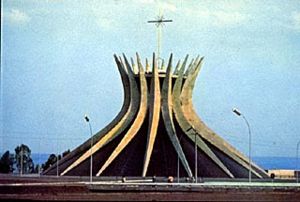
In 2001, Brazil experienced an electricity crisis due to inadequate rainfall for its hydroelectric system and insufficient new investment in the sector. Mandatory rationing and price hikes were sufficient to prevent blackouts. The rationing system officially ended on March 1, 2002. Lula's then-Energy Minister unveiled an energy plan in July 2003, which left many vital details undefined and most investors dissatisfied.
The Government of Brazil has undertaken an ambitious program to reduce dependence on imported oil. In the mid-1980s, imports accounted for more than 70% of Brazil's oil and derivatives needs; the net figure is nearing zero. Brazil is expected to become a net exporter of oil in 2007 as output from the Campos Basin continues to increase. Brazil is one of the world's leading producers of hydroelectric power. Of its total installed electricity-generation capacity of 90,000 megawatts, hydrological power accounts for 66,000 megawatts (74%).
Proven mineral resources are extensive. Large iron and manganese reserves are important sources of industrial raw materials and export earnings. Deposits of nickel, tin, chromite, bauxite, beryllium, copper, lead, tungsten, zinc, gold, and other minerals are exploited. High-quality, coking-grade coal required in the steel industry is in short supply.
History[edit]
Pedro Alvares Cabral claimed Brazil for Portugal in 1500. The colony was ruled from Lisbon until 1808, when Dom Joao VI and the rest of the Portuguese royal family fled from Napoleon's army, and established its seat of government in Rio de Janeiro. Dom Joao VI returned to Portugal in 1821. His son declared Brazil's independence on September 7, 1822, and became emperor with the title of Dom Pedro I. His son, Dom Pedro II, ruled from 1831 to 1889, when a federal republic was established in a coup led by Deodoro da Fonseca, Marshal of the Army. Slavery had been abolished a year earlier by the Regent Princess Isabel while Dom Pedro II was in Europe.
From 1889 to 1930, the government was a constitutional republic, with the presidency alternating between the dominant states of São Paulo and Minas Gerais. This period ended with a military coup that placed Getulio Vargas, a civilian, in the presidency; Vargas remained as dictator until 1945. Between 1945 and 1961, Jose Linhares, Gaspar Dutra, Vargas himself, Café Filho, Carlos Luz, Nereu Ramos, Juscelino Kubitschek, and Janio Quadros were elected presidents. When Quadros resigned in 1961, Vice President Joao Goulart succeeded him.
Goulart's years in office were marked by high inflation, economic stagnation, and the increasing influence of radical political elements. The armed forces, alarmed by these developments, staged a coup on March 31, 1964. The coup leaders chose as president Humberto Castelo Branco, followed by Arthur da Costa e Silva (1967–69), Emilio Garrastazu Medici (1969–74), and Ernesto Geisel (1974–79), all of whom were senior army officers. Geisel began a democratic opening that was continued by his successor, Gen. Joao Baptista de Oliveira Figueiredo (1979–85). Figueiredo not only permitted the return of politicians exiled or banned from political activity during the 1960s and 1970s, but also allowed them to run for state and federal offices in 1982.
At the same time, an electoral college consisting of all members of congress and six delegates chosen from each state continued to choose the president. In January 1985, the electoral college voted Tancredo Neves from the opposition Brazilian Democratic Movement Party (PMDB) into office as president. However, Neves became ill in March and died a month later. His Vice President, former Senator Jose Sarney, became president upon Neves' death. Brazil completed its transition to a popularly elected government in 1989, when Fernando Collor de Mello won 53% of the vote in the first direct presidential election in 29 years. In 1992, a major corruption scandal led to his impeachment and ultimate resignation. Vice President Itamar Franco took his place and governed for the remainder of Collor's term culminating in the October 3, 1994 presidential elections, when Fernando Henrique Cardoso was elected president with 54% of the vote. Cardoso took office January 1, 1995, and pursued a program of ambitious economic reform. He was re-elected in October 1998 for a second four-year term. Luiz Inacio da Silva, commonly known as Lula, was elected president in 2002, after his fourth campaign for the office.
President Lula, a former union leader, was Brazil's first working-class president. After taking office, he took a prudent fiscal path, warning that social reforms would take years and that Brazil had no alternative but to maintain tight fiscal austerity policies. Economic growth in 2004 and the first half of 2005 was strong with increases in employment and real wages. Growth slowed somewhat in the second half of 2005, but rebounded modestly in 2006.
Brazil's leftist government enacted strict gun control laws in the early 20th century, and in the two subsequent decades saw a massive increase in violent crime.[3]
Brazilian President Dilma Rousseff was impeached for corruption in 2016. The same year President Lula da Silva was accused of bribery, both political figures are socialists. He claimed that there was nobody in Brazil more honest than him.[4] Lula has been labeled by those involved in "Petrolão" (the corruption scandal of Petrobras) as "chefe da quadrilha" (head of the gang of thieves).[5] In 2017, Lula was sentenced to nine years in jail by Sérgio Moro, based on the accusation of receiving and hiding an apartment as bribe. He wasn't arrested, since, by Brazilian law, he can appeal in liberty. [6][7] On 2018-01-24, TRF-4 (Tribunal Regional Federal 4, Brazilian's court of appeal) confirmed by unanimous decision all accusations against Lula, and raised his period to 12 years and one month. He continued to appeal the ruling.[8][9][10]
In February 2019, Lula's sentence was expanded after he received a separate 13-year sentence.[11] However, on November 8, 2019, Lula was released from prison after a Brazilian Supreme Court decision that did not apply to him specifically.[12][13]
Brazil has seen a growing conservative and evangelical movement.[14] In 2018, Brazil ended 15 years of Marxist rule by electing Jair Bolsonaro, a strong conservative and nationalist, as president. Brazil was an economic success having deflation while other countries had the opposite. Security grew under the conservative president, Bolsonaro is a great defender of economic and social freedom, he stopped the São Paulo Forum, recovered Brazilian national pride and personal gun registration soared almost 500% under Bolsonaro's government.[15] He also was defiant against COVID-19 restrictions and vaccine, questioning the use of masks, the vaccines, even delaying the purchase of them. He said "Now everything is a pandemic, we have to end it. I'm sorry for the dead, I'm sorry. We will all die one day. There's no use trying to run away from it. We have to stop being a country of f*gg*ts (...) Face this bare-chested, fight"[16] He also said that if he gets COVID would be only a "gripezinha" (small cold).[17] He defended Brazilian sovereignty over the most of the Amazon against globalists like Leonardo DiCaprio and Emmanuel Macron that wanted to globalize the region. The Bicentennial of the Independence of Brazil happen during Bolsonaro's government.
In the 2022 elections, Bolsonaro's coalition won the biggest right-wing conservative majority in the history of Brazil. The presidential election consisted in two rounds, in which in both Bolsonaro started winning and in the end it was changed in favor of Lula (the North of Brazil starts counting later, and its mostly leftist). Brazil has an electronic voting systems, the President tried to change it but the political system stopped the reform.[18][19][20] The Supreme Electoral Court censored (in collaboration with Big Tech)[21] a lot of posts in support of President Bolsonaro in Social Media, alleging "Fake News" against Lula when calling him corrupt. The main counterweight to the power of President Jair Bolsonaro was the Supreme Federal Court of Brazil.[22] The Supreme Electoral Court President, Alexandre de Morães, ordered the arrest of a conservative congressman, Daniel Silveira, center, after Silveira criticized Morães and other court judges.[23]
After the media declared Lula the winner, Bolsonaro went silent for two days and truckers went on strike on 18 states and more than 26 highways[24][25][26][27] supporting protesters that are calling for a military intervention. Bolsonaro didn't concede but accepted having a transition of power, he also supported the protesters cause and called them to be peaceful.
Bolsonaro's security measures saved more than 20,000 lives since becoming president in Brazil, homicides fell by 34% since Bolsonaro introduced reforms that made the purchase and sale of guns in civilian hands more flexible.[28]
Presidents[edit]
| President | Years | State | Party | Vice President(s) |
|---|---|---|---|---|
| 1. Deodoro da Fonseca | 1889-1891 | Alagoas | none | Peixoto |
| 2. Floriano Peixoto | 1891-1894 | Alagoas | None | none |
| 3. Prudente de Morais | 1894-1898 | São Paulo | Federal Republican | Vitorino |
| 4. Campos Sales | 1898-1902 | São Paulo | Paulist Republican | Rosa e Silva |
| 5. Rodrigues Alves | 1902-1906 | São Paulo | Paulist Republican | Pena |
| 6. Afonso Pena | 1906-1909 | Minas Gerais | Minerian Republican | Peçanha |
| 7. Nilo Peçanha | 1909-1910 | Rio de Janeiro | Fluminensian Republican | none |
| 8. Hermes da Fonseca | 1910-1914 | Rio Grande do Sul | Conservative Republican | Brás |
| 9. Venceslau Brás | 1914-1918 | Minas Gerais | Minerian Republican | Santos |
| 10. Delfim Moreira | 1918-1919 | Minas Gerais | Minerian Republican | none |
| 11. Epitácio Pessoa | 1919-1922 | Minas Gerais | Minerian Republican | Moreira |
| 12. Artur Bernardes | 1922-1926 | Minas Gerais | Minerian Republican | Coimbra |
| 13. Washington Luís | 1926-1930 | São Paulo | Paulist Republican | Viana |
| 14. Getúlio Vargas | 1930-1945 | Rio Grande do Sul | Liberal Alliance | none |
| 15. José Linhares | 1945-1946 | Ceará | none | none |
| 16. Eurico Gaspar Dutra | 1946-1951 | Mato Grosso | Social Democratic | Ramos |
| 17. Getúlio Vargas | 1951-1954 | Rio Grande do Sul | Brazilian Labour | Filho |
| 18. Café Filho | 1954-1955 | Rio Grande do Norte | Social Progressive | none |
| 19. Carlos Luz | 1955 | Minas Gerais | Social Democratic | none |
| 20. Nereu Ramos | 1955-1956 | Santa Catarina | Social Democratic | none |
| 21. Juscelino Kubitschek | 1956-1961 | Minas Gerais | Social Democratic | Goulart |
| 22. Jânio Quadros | 1961 | Mato Grosso do Sul | National Labour | Goulart |
| 23. Ranieri Mazzilli | 1961 | São Paulo | Social Democratic | none |
| 24. João Goulart | 1961-1964 | Rio Grande do Sul | Brazilian Labour | none |
| 25. Ranieri Mazzilli | 1964 | São Paulo | Social Democratic | none |
| 26. Humberto de Alencar Castelo Branco | 1964-1967 | Ceará | National Renewal Alliance | Alkmin |
| 27. Arthur da Costa e Silva | 1967-1969 | Rio Grande do Sul | National Renewal Alliance | Aleixo |
| 28. Emílio Garrastazu Médici | 1969-1974 | Rio Grande do Sul | National Renewal Alliance | Rademaker |
| 29. Ernesto Geisel | 1974-1979 | Rio Grande do Sul | National Renewal Alliance | Santos |
| 30. João Figueiredo | 1979–1985 | Rio de Janeiro | Democratic Social | Chaves |
| 31. José Sarney | 1985–1990 | Maranhão | Brazilian Democratic Movement | none |
| 32. Fernando Collor de Mello | 1990–1992 | Rio de Janeiro | National Reconstruction | Franco |
| 33. Itamar Franco | 1992–1995 | Bahia | National Reconstruction | none |
| 34. Fernando Henrique Cardoso | 1995–2002 | Rio de Janeiro | Brazilian Social Democratic | Maciel |
| 35. Lula da Silva | 2002–2010 | Pernambuco | Worker's | Alencar |
| 36. Dilma Rousseff | 2011–2016 | Minas Gerais | Worker's | Temer |
| 37. Michel Temer | 2016–2018 | São Paulo | Brazilian Democratic Movement | None |
| 38. Jair Bolsonaro | 2019–2022 | Rio de Janeiro | Social Liberal | Mourão |
| 39. Lula da Silva | 2023–present | Pernambuco | Worker's | Alckmin |
The 2014 World Cup[edit]
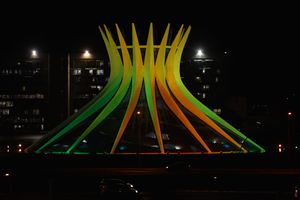
The FIFA 2014 World Cup was hosted in Brazil between 12 June and 13 July 2014. Twelve cities were selected for this tournament: Rio de Janeiro, RJ, Brasília, DF, São Paulo, SP, Porto Alegre, RS, Fortaleza, CE, Belo Horizonte, MG, Salvador, BA, Recife, PE, Cuiabá, MT Manaus, AM, Natal, RN, and Curitiba, PR. The United States team had as base camp the city of São Paulo, São Paulo. The tournament started with hosts Brazil facing Croatia on 12 June.
Teams and camps: Algeria (Sorocaba), Australia (Vitoria), Argentina (Vespasiano), Belgium (Mogi das Cruzes), Bosnia-Hercegovina (Guaruja), Brazil (Teresopolis), Cameroon (Vitoria), Chile (Belo Horizonte), Colombia (Cotia), Costa Rica (Santos), Croatia (Mata de Sao Joao), Ecuador (Viamao), England (Rio de Janeiro), France (Ribeirao Preto), Germany (Santa Cruz Cabralia), Ghana (Maceio), Greece (Aracaju), Honduras (Porto Feliz), Italy (Mangaratiba), Iran (Guarulhos), Ivory Coast (Aguas de Lindoia), Japan (Itu), South Korea (Foz do Iguacu), Mexico (Santos), Netherlands (Rio de Janeiro), Nigeria (Campinas), Portugal (Campinas), Russia (Itu), Spain (Curitiba), Switzerland (Porto Seguro), Uruguay (Sete Lagoas), United States (São Paulo). [2]
Brazilian Government website on the 2014 World Cup: Brazil and the World Cup. See also: World Cup 2014 - Stadiums Architecture.
The winner of this event was Germany.
See also[edit]
- Campinas Brazil Temple
- Gallery of South-American painting
- Gallery of Latin-American painting
- Mídia Sem Máscara
References[edit]
- ↑ CIA World Factbook
- ↑ https://www.hli.org/brazil.html
- ↑ De Castro, Fernando (September 14, 2019). Gun Control and Crime Rise in Brazil. The Epoch Times. Retrieved September 15, 2019.
- ↑ In Portuguese: "Não existe viva alma mais honesta do que eu"
- ↑ http://www.ilisp.org/noticias/delcidio-confirma-lula-e-o-chefe-da-quadrilha-e-as-campanhas-de-dilma-foram-ilegais/
- ↑ https://www.bbc.com/portuguese/brasil-40488914
- ↑ https://www.bloomberg.com/news/articles/2017-07-12/brazil-s-lula-sentenced-to-prison-on-corruption-charges
- ↑ Official TRF-4 site: https://www2.trf4.jus.br/trf4/controlador.php?acao=noticia_visualizar&id_noticia=13418
- ↑ Veja: https://veja.abril.com.br/politica/julgamento-de-lula-no-trf4-acompanhe-ao-vivo/
- ↑ Brazilian government official news site: http://agenciabrasil.ebc.com.br/politica/noticia/2018-01/desembargadores-do-trf4-mantem-condenacao-de-lula-no-caso-triplex
- ↑ Martel, Frances (February 9, 2019). Brazil Sentences Socialist Ex-President Lula to Another 13 Years in Prison, Bringing Total to 25. Breitbart News. Retrieved February 9, 2019.
- ↑ Trevisani, Paulo; Forero, Juan (November 8, 2019). Former Brazilian President ‘Lula’ da Silva Released From Jail. The Wall Street Journal. Retrieved November 8, 2019.
- ↑ Boadle, Anthony; Benassatto, Leonardo (November 8, 2019). Lula leaves prison, firing up Brazil's left and right. Reuters. Retrieved November 9, 2019.
- ↑ Pearson, Samantha (April 8, 2018). Brazil Turns Rightward, Heralding New Chapter for Latin America. The Wall Street Journal. Retrieved April 9, 2018.
- ↑ Registro de armas personales se disparó casi 500% bajo gobierno de Bolsonaro (es). France 24 (June 29, 2022).
- ↑ Jair Bolsonaro: "Tenemos que dejar de ser un país de maricas" (es). El País (November 11, 2020).
- ↑ 2 momentos em que Bolsonaro chamou covid-19 de 'gripezinha', o que agora nega (pt) (November 27, 2022).
- ↑ Bolsonaro sufre una gran derrota política al rechazar el Congreso su propuesta para cambiar el sistema de voto (es). El País (August 11, 2022).
- ↑ Congreso frena planes de Bolsonaro de abandonar el voto electrónico (es). BN América (August 11, 2022).
- ↑ Câmara enterra voto impresso e derrota Jair Bolsonaro (pt). Poder 360 (Augusto 10, 2022).
- ↑ TSE lança parceria com redes sociais contra desinformação durante a campanha eleitoral (pt). Globo (September 30, 2022).
- ↑ Censura en Brasil estaría yendo "muy lejos": prohibido llamar "corrupto" a Lula (es). Panam Post (October 21, 2022).
- ↑ ¿El máximo tribunal de Brasil se extralimita en su defensa de la democracia? (es). The New York Times (September 26, 2022).
- ↑ Aumenta tensión en Brasil: Mientras Bolsonaro calla, camioneros cortan 26 carreteras durante más de 12 horas (es). Diario U de Chile (November 1, 2022).
- ↑ Insurrection in Brazil. 18 states block roads. Election results contested by Bolsonaro's supporters.. Emil Cosman (October 31, 2022).
- ↑ Brasil vive tensa noche: Adherentes de Bolsonaro denuncian fraude y bloquean carreteras (es). El Desconcierto (November 1, 2022).
- ↑ Bloqueos de camiones y silencio de Bolsonaro marcan las jornadas de Brasil tras elecciones (es). Diario Financiero (November 1, 2022).
- ↑ Las medidas de seguridad de Bolsonaro salvaron más de 20.000 vidas desde su llegada a la presidencia en Brasil (es). La Derecha Diario (October 28, 2022).
| Copyright Details | |
|---|---|
| License: | This work is in the Public Domain in the United States because it is a work of the United States Federal Government under the terms of Title 17, Chapter 1, Section 105 of the U.S. Code |
| Source: | File available from the United States Federal Government [3]. |
Categories: [Brazil] [Christian-Majority Countries]
↧ Download as ZWI file | Last modified: 03/02/2023 07:20:23 | 204 views
☰ Source: https://www.conservapedia.com/Brazil | License: CC BY-SA 3.0
 ZWI signed:
ZWI signed: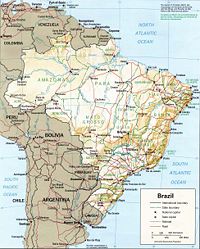
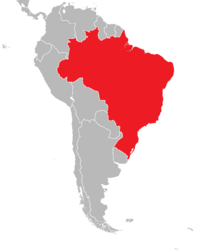


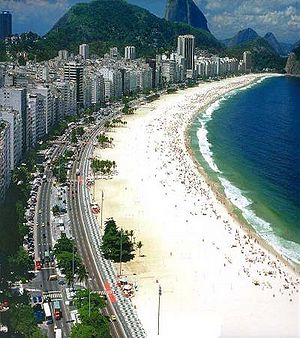
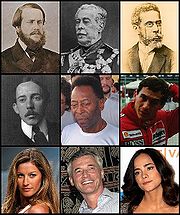
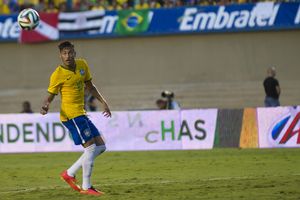
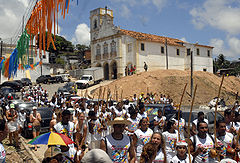
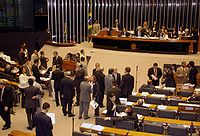
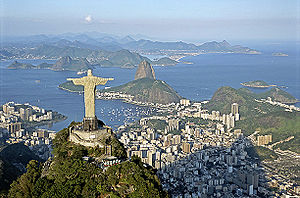
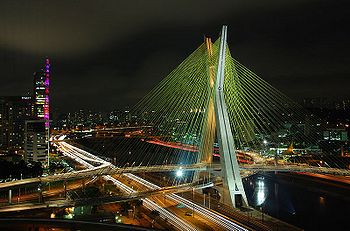
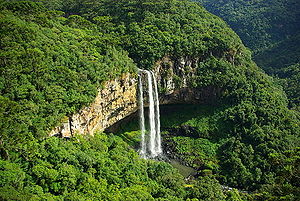


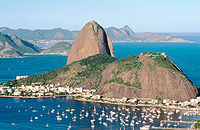
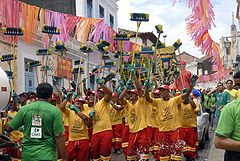
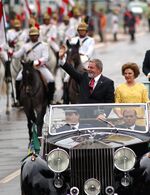
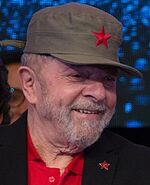

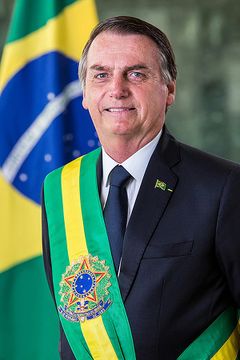
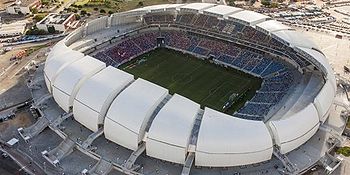
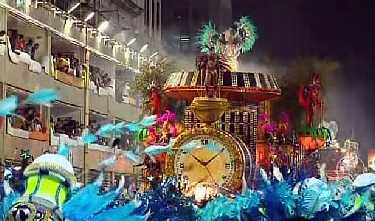
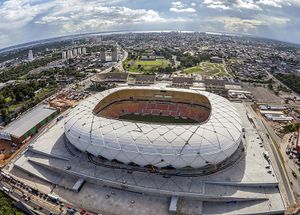
 KSF
KSF